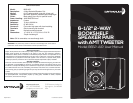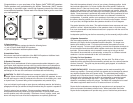
Front without grill Side Back Front
Congratulations on your purchase of the Dayton Audio
®
B652-AIR speakers.
These speakers use groundbreaking Air Motion Transformer (AMT) tweeter
technology to reproduce clear, natural high frequency sound that rivals many
more expensive speakers. Please read on to discover how to get the most from
your new speakers.
1) Parts Inventory
The B652-AIR speaker package includes the following items:
• 1 pair of Dayton Audio B652-AIR speakers
• 1 pair of 2-conductor red/black speaker cables
2) Installation Tools
No tools are required for installation of the B652-AIR speakers. Additional tools
and hardware may be required for wall mounting.
3) Speaker Placement
Because of their well-behaved off-axis response and excellent dispersion, your
new Dayton Audio speakers are less critical to position than most loudspeakers.
Often, simply placing them where they best fit into the decorating scheme is all
that is necessary for exceptional performance. The B652-AIR speakers feature a
wall hanger on the rear of the enclosure to facilitate safe wall mounting.
CAUTION: The B652-AIR speakers are compact in size, but substantial in
weight. When wall-mounting or shelf-mounting the B652-AIR speakers, be sure
that the wall hanger or shelf is anchored to the structure of the building via a stud
or drywall insert, to prevent falling of the loudspeakers and potential injury.
If you are inclined to go through a more rigorous positioning exercise, the following
paragraphs will help you achieve all the performance that your system is capable of.
Carefully select a few recordings. Choose recordings made with simple
arrangements and strong vocals by a single performer. Physically small sound
sources localize much more precisely. Placement of horns, strings, vocals, and
drums will snap into focus when the loudspeakers are optimally positioned.
Start with the speakers directly in front of your primary listening position. Avoid
hard vertical edges within 3 or 4 feet of either side of the cabinet. Position the
cabinets about 1-2 feet out from the wall. Listen to one of the selected recordings
paying close attention to the positions of the instruments and vocalist. Move the
speakers a few inches at a time, returning to the listening position to evaluate the
results. Once placement is optimized, the vocalist will be firmly positioned in front
of the instruments and the instruments will seem to be between or behind the
loudspeakers. If possible, position your speakers to that when you are seated in
the primary listening position your ears are 10-12 feet from the tweeter. Viewed
from your seat, the angle between the speakers should be 30 to 60 degrees.
Pay special attention to the bass. The relation between bass response and room
position is critical. Adjust the position of the speakers closer to or further away
from room boundaries so that the bass levels are in proportion with the rest of the
musical spectrum.
Loudspeaker positioning can be time-consuming, but the rewards justify the effort.
4) Speaker Connection
Use the supplied speaker wire or other good quality wire for the connection
between your Dayton Audio loudspeakers and the amplifier. For longer runs,
heavier wire should be used. For proper performance the speakers must be
“phased” correctly. To insure proper phasing, connect the red speaker terminals to
the red amplifier terminals and the black speaker terminals to the black amplifier
terminals. All two-conductor wire is marked in some way to help you do this.
One side will be marked with a colored stripe, a raised rib, or a different colored
conductor. Use the marked side for the “red” connections.
5) Caring For Your Speakers
Clean your speakers by wiping with a damp, lint-free cloth. The finish of your
speakers can be maintained and enhanced by periodic use of a surface protection
such as “ArmorAll”. The grills may be vacuumed, gently tapped, or brushed to
remove dust and debris.
POWER RATING NOTE: Almost any speaker can be used successfully with
almost any amplifier. Conversely, almost any speaker can be damaged by almost
any amplifier despite either unit’s power rating. The published power rating is
accurate only if the volume level is never set above the point of audible distortion.
Distortion is an indication that the amplifier or loudspeaker is operating beyond
its design limits, and damage may occur – often within seconds. If you hear
distortion, immediately reduce the volume. The B652-AIR is designed to be used
with stereo equipment rated from 5 to 75 watts and from 4 to 8 ohms.
Dayton Audio loudspeakers are designed to reproduce music and speech in a
home environment at moderate volume levels. When used within their limits
Dayton Audio loudspeakers will provide many years of trouble free performance.




